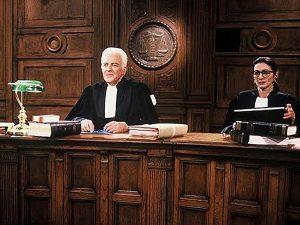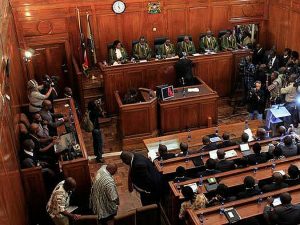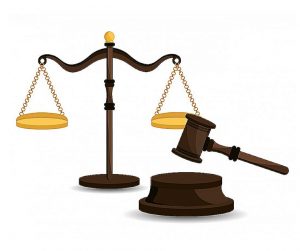Alajemba Uke V Alberto Iro 2001 11 Nwlr (Pt. 723) 196: This is an action commenced at the Customary Court contesting title to certain piece of land between the plaintiff and the defendant. The court gave judgment in favour of the plaintiff. The defendant went on appeal. The Customary Court of Appeal upheld the decision of the court below and in that course, took the chance to make certain judicial pronouncements arising from the matter such as the issue of discrimination, and the effect of discrepancy in the name of land.

Recommended: Best Countries To Migrate/Relocate To From Nigeria
Facts Of The Case
The plaintiff commenced this action in the Customary Court at Okigwe, from where it went on appeal in the Customary Court of Appeal of Imo State. The subject matter in dispute was a piece of land situate at one Ikoponkwo land. The case of the plaintiff is that the said piece of land in dispute devolved to him from his father through the means of customary inheritance. He claimed that his father had enjoyed uninterrupted usage of the land in dispute, where he cultivated crops and economic trees. The basis of the plaintiff’s claim is that the defendant being his boundary neigbour had encroached into the portion of land belonging to him.

Due to the ill health of the plaintiff’s father, he was unable to bring an action against the alleged encroachment, hence his son standing in his position. The father also gave evidence in the course of the suit, testifying that his own father who lived for over 100 years also farmed on the land during his lifetime, and that the land in dispute was his own share from his father’s estate which his father got from one of his Kinsmen. On the other hand, the defendant also claimed ownership of the land in dispute.
His case was that the land belongs to Alajemba, and that prior to the land devolving to him, it has been subject to ownership by 7 men of his family preceding him. He gave evidence that in the struggle of the land, the plaintiff once took them to a shrine and warned them to desist from laying claims over the land. The defendant gave further evidence which were corroborated, establishing the root of his title.
It must be noted that at the time the cause of action arose and consequent action instituted, the plaintiff was the party in possession of the land. In the course of the proceeding, the court went on a visit to locus in quo. Upon evaluating the evidence and testimonies of the parties and the witnesses, the court ruled in favour of the plaintiff. Aggrieved by the decision of the Customary Court, the defendant lodged an appeal to the Customary Court of Appeal.
Recommended: Countries Where Teachers Are Paid the Most
Issues for Determination
The centre-point of the issues formulated was whether in the light of the evidence presented by the plaintiff at the Customary Court, it is convincing enough to justify judgment being given in his favour.
Again, the issue as to whether the nomenclature of the land in dispute actually misled or prejudiced the defendant in this case, and whether a woman married into the family, being a widow can be proceeded against for trespass.

Recommended: Most Dangerous People In the World
Decision of the court
The Customary Court Appeal in its appellate capacity did not find merit in the case of the appellant. First, the court did not hesitate to disclose his concern for the lack of clarity and precision of the case of the appellant starting from the manner in which his issues were framed, up till the content of the brief. The court employed this opportunity to reemphasize that the issued contained in a brief must be characterized by precision, clarity and brevity.

On the appellant’s argument that by virtue of Nnewi custom, a woman cannot give evidence in a case relating to title to land, the court discountenanced the argument on the basis of its unconstitutionality. The court held the assertion to be contrary to section 39(1) of the 1979 Constitution of the Federal Republic of Nigeria (now section 41(1) of the 1999 constitution) which provides that no person shall be discriminated on the basis of sex, amongst other things. The noted further expressed that such laws or practices which regard women as second-class citizens are bygone and have become matters of history. Any such law practice is not in consonance with Nigerian jurisprudence and should be utterly voided and dismissed. The court made reference to the notorious case of Mojekwu and Mojekwu and likened the circumstance to the instance case. The court dismissed the argument of the appellant accordingly and entirely, and held that a woman can give evidence in a dispute relating to title to land.
On the substance of the suit, the court noted that the main issued before it relates to whether the plaintiff/respondent proved his case on a preponderance of evidence at the court below, to warrant judgment being given in his favour. The court observed that after a holistic perusal of the judgment of the court below, it seems that nothing could ever warrant an overturn of the judgment. The court observed that the respondent established credibly how the property devolved to him, and that it was clear from the history that the land was never a pledge given to his family; rather, it was a gift which they obtained for over one century in the past. The court observed the contradictories of the evidence of the appellant’s witnesses at the court below, including and particularly that of the star witness.
The court regarded her testimony as that of a parrot which lacks substance and at best, confusing, and that the lower court was right to have disregarded her testimony.
The plaintiff/respondent’s witness while giving his evidence called the land in dispute “Nkwo Chukwu Nnaeto” whereas the plaintiff/respondent himself called the land Ikpa Nkwo. The court in this regard observed that the discrepancy in the nomenclature of the land in dispute does not go to the root of the matter, and that the appellant merely wants to make a case out of it. The Customary Court of Appeal therefore upheld the decision of the Customary Court in its entirety, holding that the appeal lacks merit. The court awarded cost of N4,000 against the appellant.
Recommended: How To Become a Successful Entrepreneur
Conclusion
The totality of this case is that the court will always be inclined to arriving at its judgment based on the evidence presented before it. This includes the testimonies of the witnesses. And when the decision of a court is arrived at correctly, the higher courts have no business overturning the decision. Hence, in the instant case, the appeal was dismissed for lack of merit.

Edeh Samuel Chukwuemeka, ACMC, is a lawyer and a certified mediator/conciliator in Nigeria. He is also a developer with knowledge in various programming languages. Samuel is determined to leverage his skills in technology, SEO, and legal practice to revolutionize the legal profession worldwide by creating web and mobile applications that simplify legal research. Sam is also passionate about educating and providing valuable information to people.